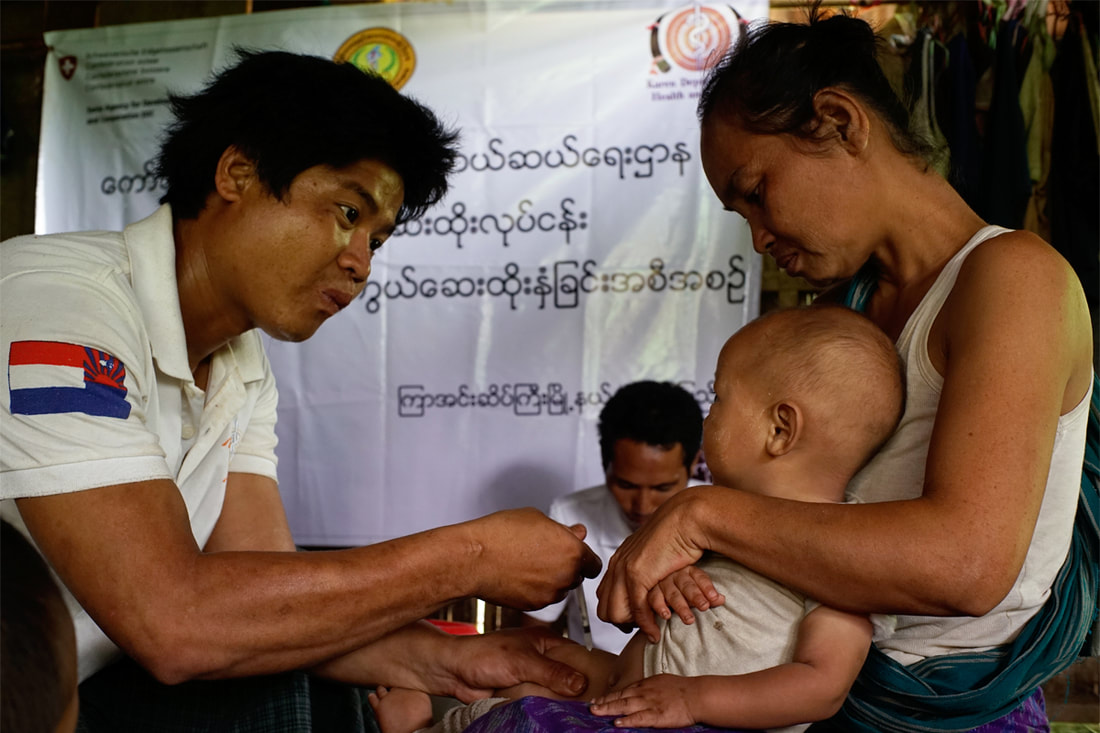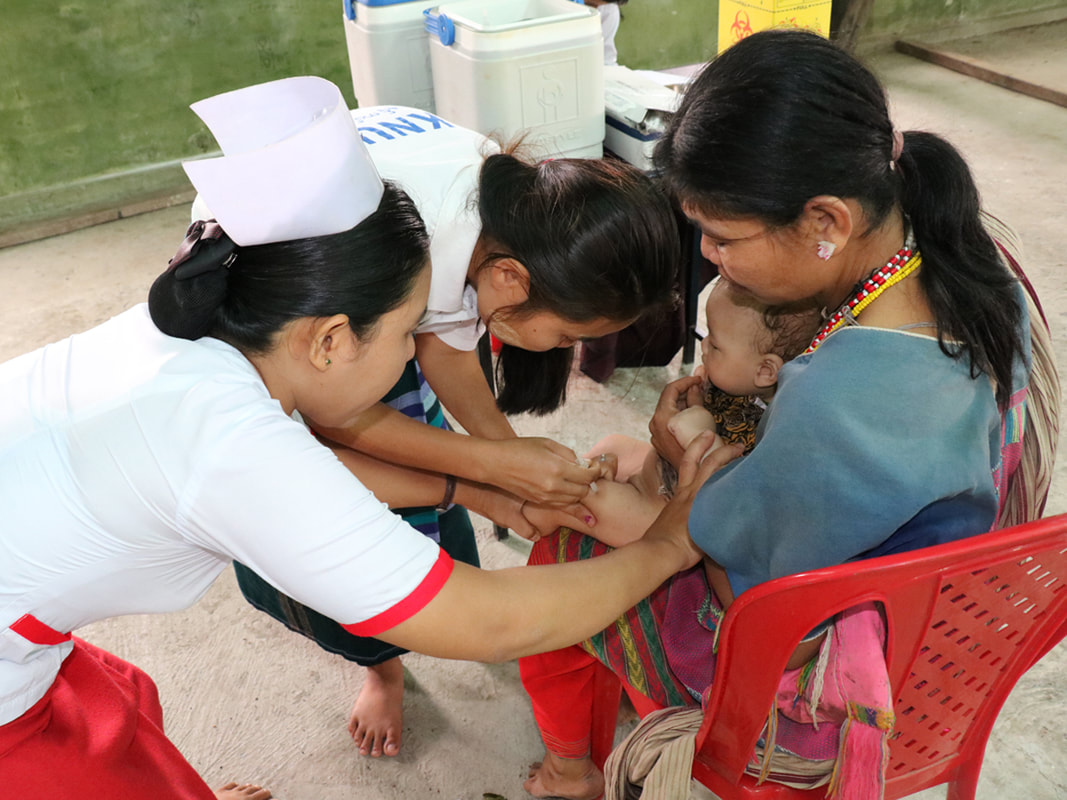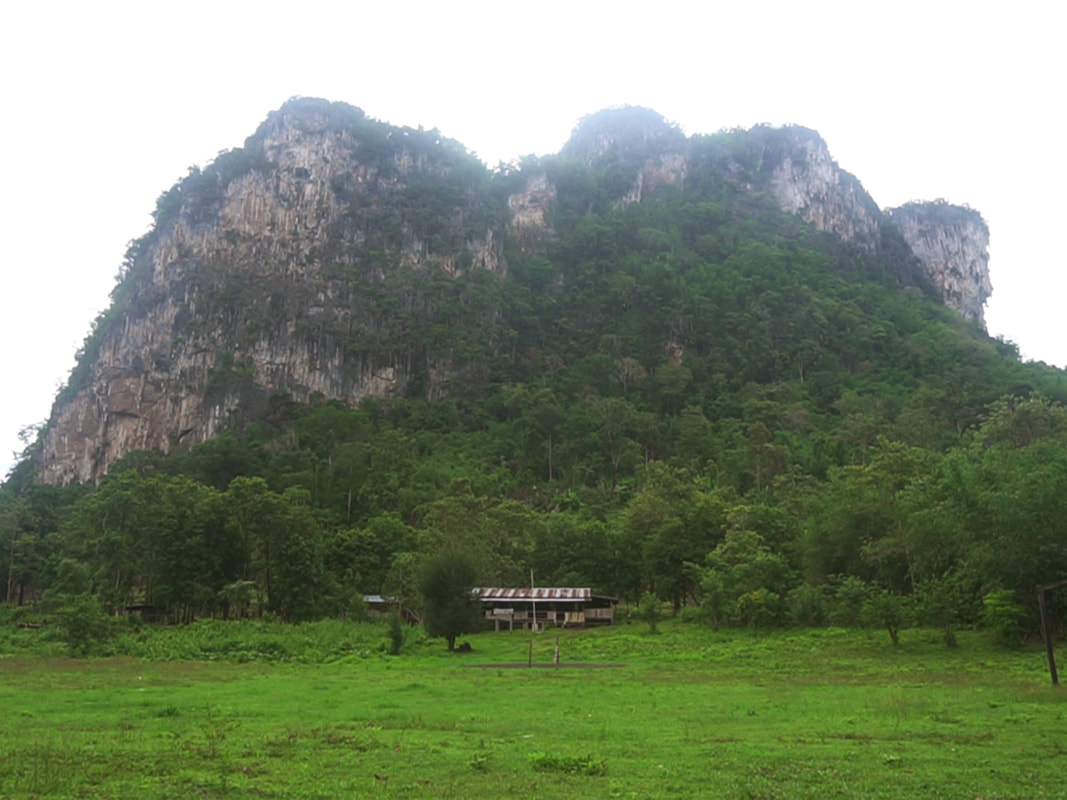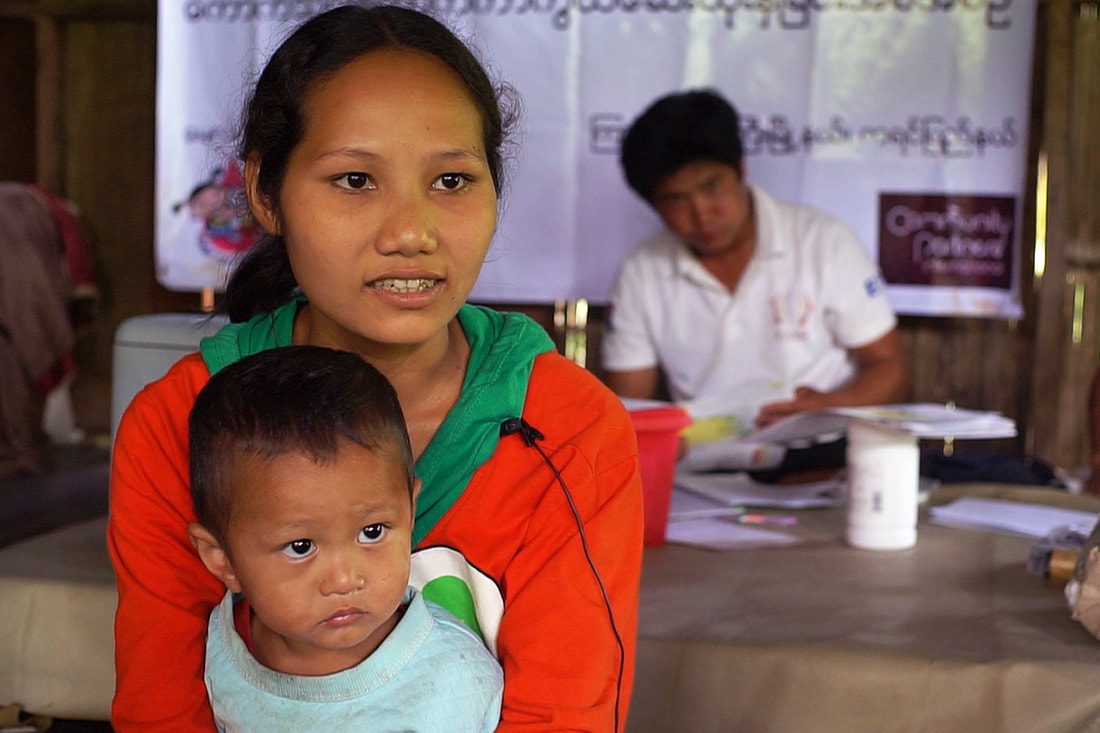Through the Eye of the Needle: Covering the Last Hundred Miles to Immunize Children in Kayin State7/18/2018
In late May, and early June, 2018, health worker teams from the Karen Department of Health and Welfare (KDHW) embarked on a fourth round of vaccinations for babies, young children and pregnant women in contested and conflict-affected areas of Kayin State, Myanmar. These communities are remote and hard to reach, accessible only along dirt tracks through mountainous and densely forested terrain that become virtually impassable during the monsoon season. This is the story of one team’s journey to provide lifesaving vaccinations to three villages in Kyainseikgyi township. For thousands of babies, young children and pregnant women in Kayin State, Myanmar, vaccination programs to immunize against deadly diseases have remained out of reach. This is the legacy of six decades of conflict that has decimated services and infrastructure, fueling a health crisis that has engulfed conflict-affected and hard-to-reach communities. With the ongoing peace process opening up space for progress, Community Partners International (CPI) is supporting groundbreaking cooperation between the Myanmar Ministry of Health and Sports (MoHS) and KDHW (working closely with other community-based health providers) to ensure that all children under five years of age and pregnant women in contested areas of Kayin State can access lifesaving vaccinations. This cooperation falls under the Expanded Program on Immunization (EPI) that Myanmar is implementing as part of their efforts to achieve Universal Health Coverage (UHC) by 2030. Under this agreement, MoHS is providing training to KDHW vaccination teams to help them meet the Myanmar national guidelines for vaccination practice. MoHS is also supplying the vaccines and providing support to ensure that the cold chain is implemented effectively. For their part, KDHW’s vaccination teams are spearheading the vaccination program on the ground, using their local expertise and strong relationships of trust with local communities, their network of community-based health centers and health workers, and a decades-long track record of health service delivery in hard-to-reach, conflict-affected areas. As part of this pilot initiative, MoHS agreed to apply flexibility to their guidelines specifying which medical personnel are authorized to carry out vaccinations so that KDHW health workers can formally participate. CPI’s role is to provide support and coordination to facilitate this cooperative endeavor. We helped to initiate and assist the discussions and planning that preceded the project roll-out. We supported training for more than 30 health workers participating in the project to help them to learn to vaccinate according to MoHS guidelines. And we are helping to set up joint supervision visits with MoHS and KDHW staff to vaccination sites so that they can monitor vaccination procedures. Starting from March 2017, KDHW vaccination teams have carried out four ‘crash’ vaccination rounds focusing on children under five and pregnant women in 132 villages in selected areas Kyainseikyi, Kawkareik, and Myawaddy townships. Each round lasts around four months, with the teams ordinarily carrying out multiple visits to each location during that period. KDHW is employing the crash vaccination technique so that they can reach a larger number of people in a smaller time period compared to standard routine vaccination schedules. This approach is necessary as many of the communities may be impossible to reach at times during the monsoon season. Even when it is not raining, it can take many days to travel relatively short distances across this forested and mountainous terrain. It requires patience, persistence, local knowledge and adaptability, with journeys often requiring travel by motorcycle, boat, field tractor and on foot. During these visits, the KDHW teams offer a range of immunization services to the communities. For babies and young children, they provide vaccinations against polio, tuberculosis, measles, rubella, diphtheria, tetanus, hepatitis B, whooping cough, haemophilus influenza type B (that can cause severe pneumonia, meningitis and other invasive diseases in children under 5), Japanese encephalitis and pneumococcal disease. For pregnant women, they provide vaccinations against tetanus and diphtheria. To date, through this cooperative program, KDHW has successfully vaccinated 4,104 children and 777 pregnant women as part of this initiative, and continuing rounds of vaccinations are scheduled through 2018 and beyond. In June, CPI accompanied a KDHW team during the fourth round of ‘crash’ vaccination in Kyainseikgyi township. First, the team heads to Kyainseikgyi Township Hospital to collect the vaccines provided by MoHS and transfers them to specialized portable cold boxes to keep them at the required temperature during transport. The team then leaves for the Village Tract Health Center in Htee Thaw Kae Hta village. The journey takes two days with heavy rains making the dirt roads increasingly treacherous. The team covers the first section, on the better roads, on small 100cc motorcycles. They are adept at navigating the potholed and uneven roads with bags full of supplies and equipment strapped to the seat or balanced up front. As the road deteriorates into a muddy track, the team transfers to a field tractor, known locally as a htaw lar kyi. With its long steering handle, high clearance and engine perched over the front wheels to provide extra traction, the htaw lar kyi can carry several people and a lot of equipment through the most difficult terrain that this region has to offer –deep, waterlogged mud, steep slippery slopes, river crossings and more. What the htaw lar kyi may lack in terms of comfort and refinement, it more than makes up for in versatility, simplicity and sheer toughness. Despite the htaw lar kyi’s qualities as an off-road champion, it still requires the effort and concentration of the whole team to coax the it across the challenging terrain. With a KDHW health worker doing the driving, the other members of the team have to be ready at any moment to leap off and push when the going gets tough, or to dig the vehicle out of the deep ruts and waterlogged mudholes that are scattered along the winding and hilly route. The team often needs to cut bamboo from the surrounding forest to wedge under the tires to provide traction in deep mud. At one moment, the htaw lar gyi loses traction at the top of a rise, and slides backwards all the way down into a muddy hole at the base, overturning on the way. Fortunately, no one is injured and the equipment and supplies also escape undamaged. The challenges of this journey illustrate vividly the meaning of ‘hard-to-reach’. Reaching these communities requires tenacity, resilience and skill on the part of the vaccination teams. It is slow, hard, draining and often frustrating traveling, but the KDHW health workers are stoic and good-humored in the face of these obstacles, and simply press on. On the second day, the immunization team reaches the KDHW Village Tract Health Center (VTHC) in Htee Thaw Kae Hta village where they base themselves for the next three days. Perched among the forests and fields in the mountainous and remote eastern edge of Kyainseikgyi township, Htee Thaw Kae Hta VTHC relies on solar panels to provide a power for refrigeration and other clinic needs. Over the next three days, the team provides immunizations to the residents of Htee Thaw Kae Hta and two villages nearby. In total, 69 children and one pregnant woman come for vaccinations. Naw Eh Paw Gay, a mother from Kwee Lae Kyay village, brings her young son to be vaccinated for the first time. ‘Immunization is vitally important,’ she says. ‘I can’t describe how valuable it is for our children. I’m very thankful because before we could not get that kind of vaccine in their area but now the vaccination teams come here to help us.’ CPI will continue to support this cooperation between MoHS, KDHW and other ethnic and community-based health providers to ensure that the Expanded Program of Immunization reaches all children under five and pregnant women in Kayin State and elsewhere in Myanmar.
KDHW’s immunization activities under the Myanmar’s Expanded Program on Immunization are supported by Community Partners International (CPI) under the Swiss Agency for Development and Cooperation (SDC)’s Primary Health Care (PHC) Project Comments are closed.
|
AuthorCPI Admin Archives
July 2024
Categories
All
|
|
|
COMMUNITY PARTNERS INTERNATIONAL
580 California St Fl 16, Ste 1658, San Francisco, CA 94104-1068, USA [email protected] +1 510 225 9676 We are a registered nonprofit 501(c)(3) Public Charity. TAX ID 94-3375666 |
©
Community Partners International





 RSS Feed
RSS Feed
